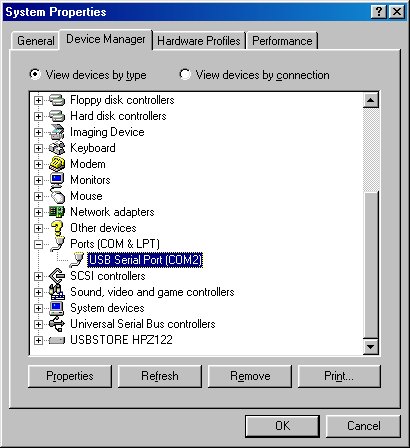
USB-RLY08
- 8
relay outputs
Technical Documentation

Overview
The USB-RLY08 provides eight volt free contact relay outputs with a current
rating of up to 1Amp each. It is powered from any standard USB bus and has an
exceptionally low maximum current consumption of approx. 90mA with all
relays on. The relays are SPCO (Single Pole Change Over) types. The normally
open, normally closed and common pins are all available on the screw terminals.
LED indication
The USB-RLY08 provides a red LED mounted immediately next to each relay to
indicate whether it is in a powered state (LED on), there is also two LED's
which will flash with USB transactions to and from the module, green indicating
reception of data from the PC and yellow the transmission of data to the PC. Finally there is red power LED mounted on the
opposite side of the board to the USB connector.
Relay power rating
If the contact load voltage and current of the relay are in the region enclosed
by the solid and dotted lines in the figure
below, the relay can perform stable switching operation. If the relay is used at
a voltage or current exceeding this region,
the life of the contacts may be significantly shortened.

First Step - Get The Drivers
The USB-RLY08 module uses the FTDI
FT232R USB chip to handle all the USB protocols. The documentation provided
by FTDI is very complete, and is not duplicated here. Before using the USB-RLY08,
you will need to install FTDI's Virtual COM Port ( VCP ) Drivers. These drivers
appear to the system as an extra Com Port ( in addition to any existing hardware
Com Ports ). Application software accesses the USB device in the same way as it
would access a standard Windows Com Port using the Windows VCOMM API calls or by
using a Com Port Library. Drivers are available for Windows, Apple,
Linux and Open BSD systems directly from the FTDI
website. You should get and install the drivers now, before you connect the
USB RLY08 to your computer. The Drivers page is here.
Which COM port?
After installing the drivers, and plugging in the USB-RLY08 module to a spare
USB port, you will want to know which COM port it has been assigned to. This
will vary from system to system depending on how many COM ports you currently
have installed. To find out where it is, right click on your "My
Computer" desktop icon and select the "Device Manager" tab. Now
scroll down and open the "Ports (COM & LPT)" tab. You should see
the USB serial port listed - COM2 in the example below. If you want to change
the COM port number - just right click on it, select properties, select advanced
and select the COM port number from the available list. The COM port should be
set up for 19200 baud, 8 data bits, no parity and two stop bits.

Commands
The USB-RLY08 operates with an easy to use command set as described in the table
below. Most commands are only a single byte and if applicable the USB-RLY08 will automatically
send its response. The only exception to this being the "Set relay
states" command which requires and additional desired states byte to be
sent immediately after the command byte.
| Command |
Action |
|
| dec | hex | |
| 90 | 5A | Get software version - returns 2 bytes, the first being the Module ID which is 8, followed by the software version |
| 91 | 5B |
Get relay states - sends a single byte back to the controller, bit high meaning the corresponding relay is powered |
| 92 | 5C | Set relay states - the next single byte will set all relays states, All on = 255 (11111111) All off = 0 |
| 100 | 64 | All relays on |
| 101 | 65 | Turn relay 1 on |
| 102 | 66 | Turn relay 2 on |
| 103 | 67 | Turn relay 3 on |
| 104 | 68 | Turn relay 4 on |
| 105 | 69 | Turn relay 5 on |
| 106 | 6A | Turn relay 6 on |
| 107 | 6B | Turn relay 7 on |
| 108 | 6C | Turn relay 8 on |
| 110 | 6E | All relays off |
| 111 | 6F | Turn relay 1 off |
| 112 | 70 | Turn relay 2 off |
| 113 | 71 | Turn relay 3 off |
| 114 | 72 | Turn relay 4 off |
| 115 | 73 | Turn relay 5 off |
| 116 | 74 | Turn relay 6 off |
| 117 | 75 | Turn relay 7 off |
| 118 | 76 | Turn relay 8 off |
Board dimensions

Test program and example source code
To get the USB-RLY08 up and running in the minimum amount of time we have put together an example program to demonstrate the functionality of the module.

The test program is available as a built exe file here USB RLY08 TEST or as c++ source code here USB RLY08.zip